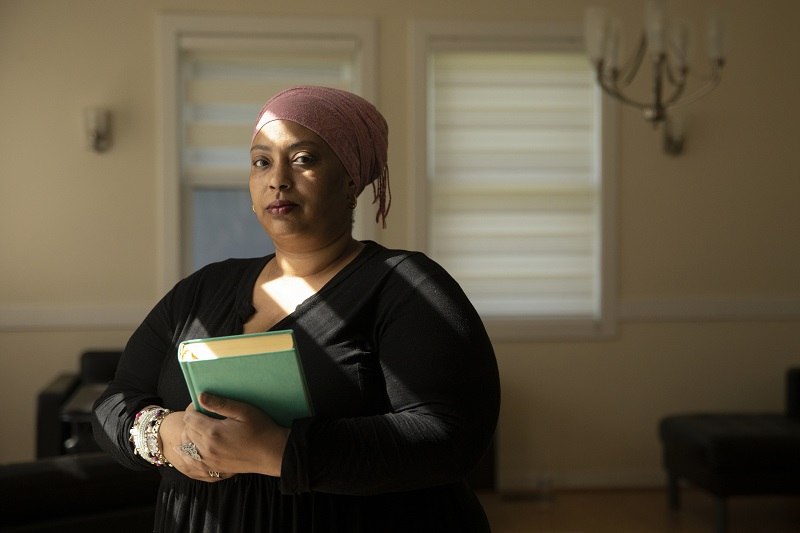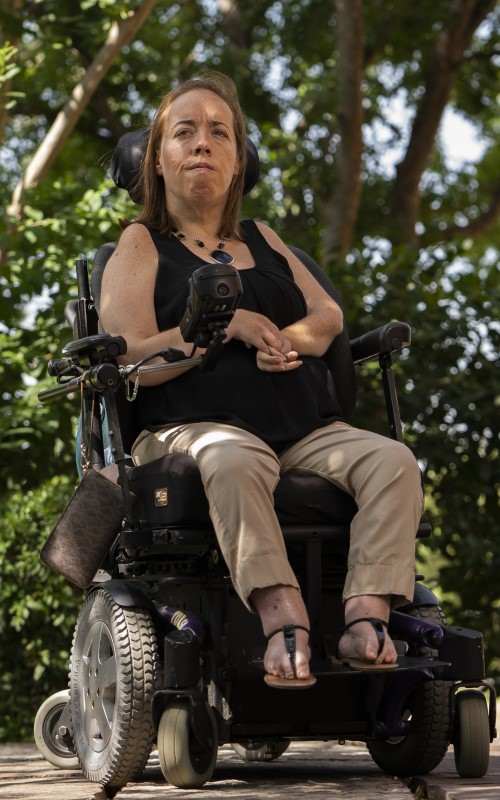
Karen Kaiser holds a Quran at her home in Lanham, Md., on July 20, 2022,.
17:08 JST, July 27, 2022
Karen Kaiser says she will never forget her feelings of dread and sadness as she hurried past picket lines of antiabortion protesters in 2008. In the waiting room of a Maryland Planned Parenthood, “I remember crying,” she said.
Kaiser had decided to have an abortion in part because she was taking a medication called Depakote to control her bipolar disorder. The drug, which is also used to treat seizures, is known to contribute to embryo malformation and to have other harmful effects on a fetus.
“I wouldn’t have been able to sustain [the pregnancy], but also we were worried about the side effects of the Depakote on the baby,” said Kaiser, now 47 and living in Lanham, Md.
Such worries are now rising for patients with disabilities, doctors say, in the weeks since the Supreme Court overturned Roe v. Wade.
Americans with disabilities – including psychiatric, chronic and physical ones – say they will be disproportionately affected by the loss of federal abortion protections and are being overlooked in the discussion. Studies have found that those with disabilities experience higher rates of sexual violence – which can lead to abortions – in addition to higher rates of unplanned pregnancies and a higher risk of death during pregnancy than people without disabilities. They may also take medications, including Depakote, that can have harmful effects on pregnancy, according to neurological studies.
Doctors say six-week abortion bans in states such as Texas would criminalize abortions before many patients discover they are pregnant and after their embryos were already exposed to such drugs. The effects of Depakote, which has the generic name valproate, and other potentially harmful medications are evident “very early in pregnancy,” said Marlene Freeman, associate director of the Center for Women’s Mental Health at Massachusetts General Hospital. Potential embryonic and fetal impacts of anti-seizure drugs include spina bifida, cleft lip and autism, studies show.
“By the time the woman knows she’s pregnant, the damage is essentially done,” said Jacqueline French, co-director of epilepsy clinical trials for NYU Langone Health’s Comprehensive Epilepsy Center.
And among women with epilepsy, French said, more than half of pregnancies are unplanned.

Robyn Powell, an associate law professor at the University of Oklahoma, in Norman, Okla., on July 22, 2022.
“If it’s a planned pregnancy, someone would try to taper off their medication,” said Robyn Powell, an associate law professor at the University of Oklahoma who has arthrogryposis, a disability that restricts motion. “But if you have an unintended pregnancy for whatever reason, I think this disproportionately harms disabled people.”
Going without such treatments can be dangerous, experts say. French, who is also the chief scientific officer of the Epilepsy Foundation, said the risk of death during pregnancy for a person with epilepsy is 10 times the risk for a person without epilepsy, partly because patients may stop taking their medication while pregnant without consulting a doctor.
Lucy Hutner, a reproductive psychiatrist in New York City, offered the example of lithium, a medication that is prescribed to treat bipolar disorder and other serious mental health conditions but that is associated with risks in pregnancy.
“Death by suicide or overdose are major causes of maternal mortality in the postpartum period, which is a significant problem because patients with bipolar disorder are already at an elevated risk of suicide,” Hutner said, noting the increased risk of homelessness when going off medication as well. “Patients in these situations benefit from being able to make individualized medical decisions that support their mental health.”
A 55-year-old epilepsy patient from North Carolina, who spoke to The Washington Post on the condition of anonymity because she feared harassment, said she took valproate during her pregnancies more than two decades ago and gave birth to three healthy sons. She said she was warned about the medication’s risks and took it anyway to control her seizures, which continued during her pregnancy.
But she said she worries about the more limited options that epilepsy patients will have now.
“What would be my concern is if they go in to have a checkup, and they find out that [the fetus has] got a serious birth defect but they want to get an abortion and aren’t able to,” she said.
Some states with abortion bans outline exceptions if the mother’s life is at risk. But Powell, the Oklahoma legal scholar, said she expects that criterion to be “stringently defined” and anticipates that physicians will be “very hesitant” to perform abortions where they are criminalized or restricted.
Antiabortion groups told The Post they did not support abortion exceptions for people with disabilities, though they did not oppose the use of essential medications that might unintentionally harm a fetus.
“Every state pro-life law in effect specifically prohibits actions which intentionally cause the death of an unborn child,” Stephen Billy, executive director of the Charlotte Lozier Institute, an antiabortion research group, said in a statement. “Doctors who prescribe teratogenic medications for the treatment of mental health or chronic health conditions are not doing so for the purpose of causing an abortion.” Teratogens are agents that can cause embryo malformations or fetal damage.
Some anti-seizure medications, though, have another side effect that compounds the risks: reducing the efficacy of hormonal contraception.
“Then the patient can in fact potentially become pregnant” despite taking contraception, said Ima Ebong, an assistant neurology professor at the University of Kentucky. In reverse, Ebong said, hormonal contraception – now more crucial for many epilepsy patients post-Roe – can allow breakthrough seizures by lowering some anti-seizure drugs’ medication levels.
For Kaiser, the Maryland resident who was taking Depakote during her pregnancy, prioritizing her medication and mental health was most important. That was what led to her trip to Planned Parenthood nearly 15 years ago.
But while the picket lines were distressing then, Kaiser said, she fears worse for disabled people who become pregnant today and are considering an abortion.
“I think forcing someone who wants and needs an abortion to continue a pregnancy is terrible,” she said. “I think it’s bad for any baby coming into the picture. I think that the decision is terrible for women who are on medication like Depakote and who may want to decide, ‘I have to keep taking this medicine, and so I’m not going to be able to continue with the pregnancy.'”
Top Articles in News Services
-

Survey Shows False Election Info Perceived as True
-

Prudential Life Expected to Face Inspection over Fraud
-

Hong Kong Ex-Publisher Jimmy Lai’s Sentence Raises International Outcry as China Defends It
-

Japan’s Nikkei Stock Average Touches 58,000 as Yen, Jgbs Rally on Election Fallout (UPDATE 1)
-

Trump Names Former Federal Reserve Governor Warsh as the Next Fed Chair, Replacing Powell
JN ACCESS RANKING
-

Japan PM Takaichi’s Cabinet Resigns en Masse
-

Japan Institute to Use Domestic Commercial Optical Lattice Clock to Set Japan Standard Time
-

Israeli Ambassador to Japan Speaks about Japan’s Role in the Reconstruction of Gaza
-

Man Infected with Measles Reportedly Dined at Restaurant in Tokyo Station
-

Man Infected with Measles May Have Come in Contact with Many People in Tokyo, Went to Store, Restaurant Around When Symptoms Emerged























